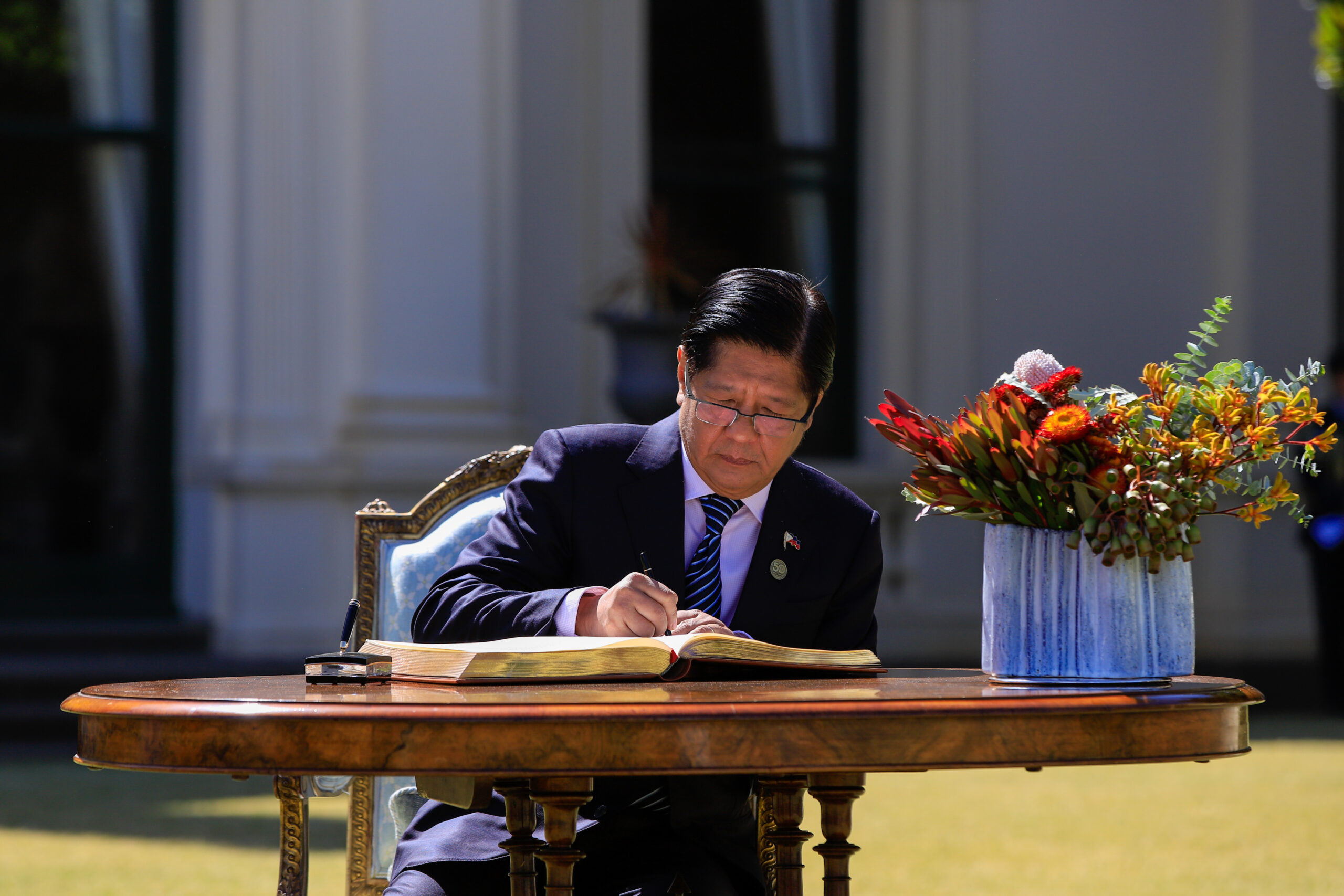
MESSAGE SENT President Marcos, pictured signing a guest book in Melbourne, on Wednesday, views China’s hostile acts “in the most serious way.” —PPA POOL
MELBOURNE—President Ferdinand Marcos Jr. said he was taking seriously the “dangerous maneuvers” of China Coast Guard (CCG) ships against Philippine vessels in Ayungin (Second Thomas) Shoal, but didn’t find the latest incident to be enough ground to invoke the country’s Mutual Defense Treaty with the United States.
While the government was alarmed by China’s actions, including a water cannon attack on a Philippine supply boat that injured four Filipinos and a minor collision with a Philippine Coast Guard (PCG) ship, “I do not think that it is time or a reason to invoke the Mutual Defense Treaty,” he said in a video statement on Wednesday.
The President’s message was released by the Presidential Communications Office before his return flight to Manila on Wednesday night after attending a special summit between the Association of Southeast Asian Nations (Asean) and Australia here.
READ: PH and China coast guard ships collide in West Philippine Sea
“However, we continue to view with great alarm these continuing dangerous maneuvers and dangerous actions that are being done against our seamen, our Coast Guard,” Mr. Marcos said.
“And this time, they damaged the cargo ship and caused some injury to some of our seamen and I think that we cannot view this in any way but in the most serious way,” the President added.
“Once again, we will make our objections known and hope that we can continue to communicate to find a way so that such actions are no longer seen in the West Philippine Sea,” he said.
Only treaty ally
Last year, Mr. Marcos made a similar statement about time not being ripe for asserting Manila’s 1951 treaty with Washington, in response to the Feb. 6, 2023, incident involving the CCG’s use of military-grade laser on the PCG’s BRP Malapascua, temporarily blinding some crew members.
The United States is the Philippines’ lone treaty ally.
The mutual defense pact states that the two countries will “act to meet the common dangers” in the event of an armed attack in the Pacific, including those “on Philippine armed forces, public vessels, or aircraft—including those of its Coast Guard—anywhere in the South China Sea.”
In a statement on Wednesday, the United States reaffirmed its commitment to the treaty as it condemned China’s “repeated obstruction” of the Philippines’ exercise of its freedom of navigation in the high seas.
“The United States stands with our ally the Philippines following the People’s Republic of China’s (PRC) provocative actions against lawful Philippine maritime operations in the South China Sea on March 5,” said US Department of State spokesperson Matthew Miller.
He said the attacks by the CCG vessels exhibited “disregard” for the safety and livelihoods of Filipinos and international law.
“As provided under the 1982 Law of the Sea Convention, the 2016 arbitral decision is final and legally binding on the PRC and the Philippines, and the United States calls upon the PRC to abide by the ruling and desist from its dangerous and destabilizing conduct,” Miller said.
Triggering the pact
Asked about actions that would trigger the pact, Miller said: “I’m not going to speculate or get ahead of any discussions—in this regard.”
But he confirmed that the United States was “in discussions with the Philippines about this matter.”
As of Tuesday, the Philippines has lodged 10 diplomatic protests against China this year, raising the total to 142 under the Marcos administration, Department of Foreign Affairs spokesperson Teresita Daza told a press briefing on Wednesday.
In his video statement, where he also answered questions from Philippine journalists, the President described the recent sighting of Chinese vessels in Philippine Rise (formerly called Benham Rise) in the country’s eastern seaboard as a “clear intrusion” into Philippine territory.
He said the Chinese vessels sighted in the area were suspected to be more than ordinary research vessels. “Once again, this is a clear intrusion into our Philippine maritime territory and it is, as usual, of great concern,” said Mr. Marcos.
No simple rivalry
During the summit proper on Wednesday, he urged leaders of Asean, Australia and other countries to remain committed to the peaceful resolution of disputes through the rule of international law.
He said a rules-based international order was important to prevent any repeat of conflict or war.
“Let me be clear: We encourage our Asean neighbors to frame conflicts not simply as rivalry between major powers, but as direct challenges to the sovereignty of independent states whose well-being, both politically and economically, are interdependent and intertwined,” Mr. Marcos said.